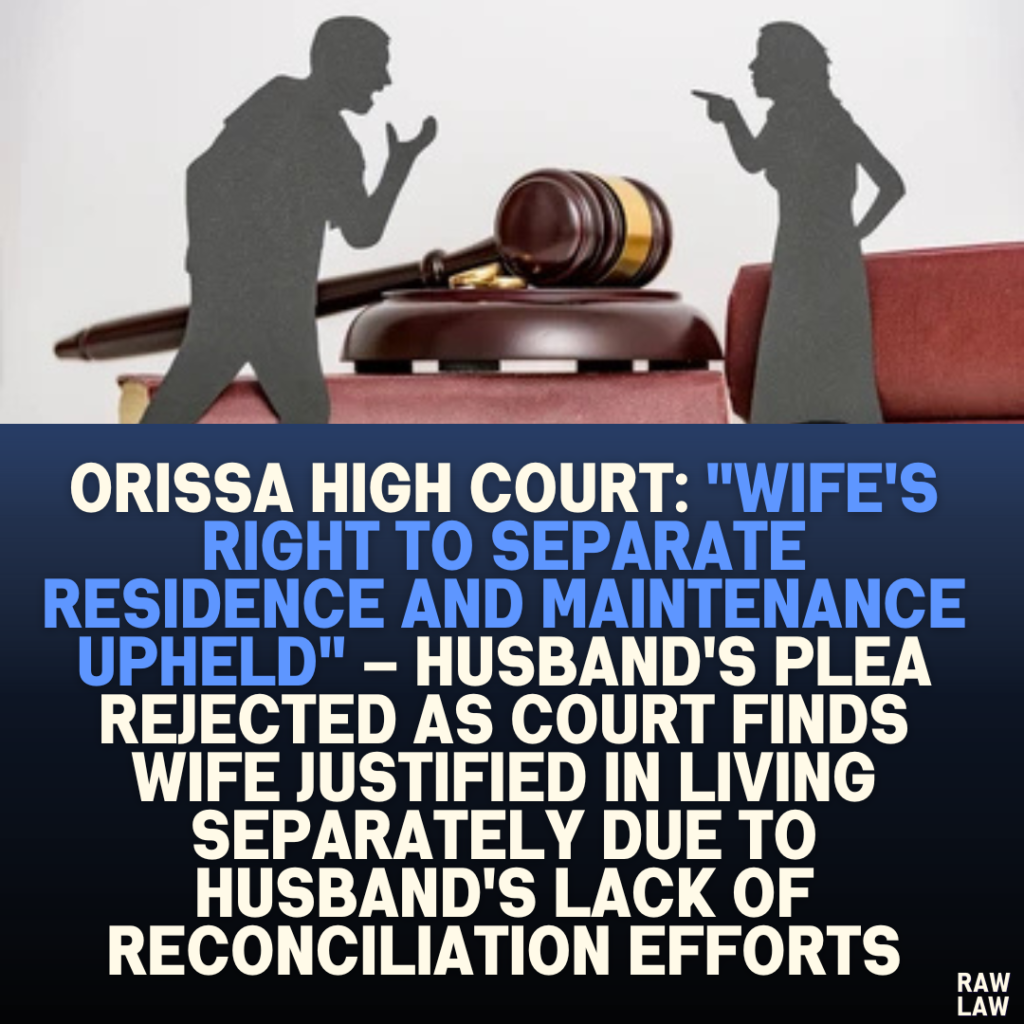Court’s Decision:
The High Court of Orissa, in its ruling, dismissed the revision petition filed by the husband. The Court upheld the Family Court’s decision directing the petitioner (husband) to pay a monthly maintenance of Rs. 2,500/- each to the wife and daughter, totaling Rs. 5,000/- per month. The Court did not find any error in the Family Court’s ruling, particularly regarding the wife’s right to live separately, which was based on sufficient cause.
Facts:
The case centers around a revision petition under Section 19(4) of the Family Courts Act, 1984, filed by the husband. The husband challenged the Family Court’s order that granted maintenance to his wife and daughter, arguing that the wife had voluntarily deserted him. The wife, on the other hand, claimed that she had been compelled to live separately due to the husband’s behavior, particularly his failure to support her and their daughter. The legal issue was whether the wife had sufficient grounds to refuse to cohabit with her husband, and whether the husband should be obligated to pay maintenance.
Issues:
The central issue that the Court had to decide was whether the wife had valid reasons to live separately from her husband under Section 125(4) of the CrPC, which disqualifies a wife from receiving maintenance if she refuses to live with her husband without sufficient cause. The Court had to determine whether the wife’s separation from the husband was justified by circumstances, thus entitling her to maintenance.
Petitioner’s Arguments:
The petitioner (husband) argued that the wife had voluntarily deserted him without a lawful excuse. He contended that the wife’s refusal to live with him was without justification and, under Section 125(4) of the CrPC, she was not entitled to maintenance. The husband further emphasized that the wife had not shown any valid reasons for her decision to separate and, as such, should not be entitled to financial support.
Respondent’s Arguments:
The wife, as the respondent, countered the husband’s claims by arguing that she had been forced to live separately due to the husband’s actions. She pointed out that the husband had not taken any steps to bring her and their daughter back into his home, even though they had been living with her parents since 2017. The wife also highlighted that the husband’s behavior, including making disparaging remarks about her character, was a clear indication of the dysfunctional nature of the marriage. She argued that her separation was not voluntary but was rather a result of being forced to leave by the husband’s family.
Analysis of the Law:
The Court examined the legal framework under Section 125(4) of the CrPC, which stipulates that a wife who refuses to live with her husband without sufficient cause is not entitled to maintenance. The Court noted that the term “sufficient cause” is subjective and depends on the specific circumstances of the case. In this case, the Court found that the wife’s refusal to cohabit with her husband was justified due to the lack of efforts from the husband to reconcile or resolve the marital issues.
Precedent Analysis:
In its analysis, the Court looked into previous judgments and applied the general principles regarding the entitlement to maintenance. It emphasized that no rigid or specific formula could be applied to determine if a wife’s reasons for living separately were sufficient. Instead, the Court highlighted the importance of examining the circumstances of each case, focusing on whether the wife, in a given situation, would have been justified in living separately. The Court also pointed out that a wife’s decision to separate could be considered justified if the husband had not made any efforts to restore the marital relationship.
Court’s Reasoning:
The Court reasoned that, based on the evidence presented, the wife’s separation was not voluntary but was a result of her being forced out by the husband’s family. The Court also noted that the husband did not make any genuine attempts to bring his wife and daughter back into the marital home, further justifying the wife’s decision to live separately. The Court also observed that the husband’s allegations against the wife’s character, calling her “quarrelsome” and “adamant,” were not sufficient grounds to deprive her of maintenance. The Court concluded that the wife had sufficient cause to live separately, and her decision was not made without reason.
Conclusion:
In conclusion, the High Court dismissed the revision petition, affirming the Family Court’s decision to award maintenance to the wife and daughter. The Court held that the wife had sufficient cause to live separately, and there was no error in the Family Court’s judgment in granting her maintenance. The Court also made it clear that when calculating arrear maintenance, the interim maintenance already paid during the pendency of the revision petition should be considered.
Implications:
This judgment reinforces the principle that a wife is entitled to maintenance if she can demonstrate valid reasons for living separately from her husband. The Court’s ruling underscores the importance of examining the facts and circumstances surrounding the separation and the actions (or inaction) of both parties. The decision also highlights that a husband’s failure to make any attempts to resolve marital issues or bring his wife back could be considered sufficient grounds for a wife to live separately. Additionally, the judgment reiterates that maintenance is a right for those unable to support themselves, especially in situations where the husband’s actions have made cohabitation untenable.
This ruling provides guidance on the legal interpretation of “sufficient cause” for living separately and sets a precedent for future cases where the entitlement to maintenance is disputed based on marital separation.




Pingback: Sikkim High Court Reiterates High Burden on Drawer to Disprove Presumption of Debt Under Section 139: Upholds Conviction for Cheque Dishonor - Raw Law